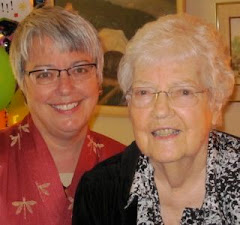The book talks about the 'young-old' vs 'old-old'. Often the difference is one's health - the 'old-old' have health issues make it more difficult to live well. In fact, this has inspired me and my husband to make some improvements in our own health. I'm almost 60, he's almost 65, and our progress so far is slow but sure.
Here are some blurbs that grabbed me, from Chapter 5. I'm sharing them, not as complete thoughts, but as teasers. Such as:
- 'The old-old die by inches'.
- Caregivers alternate between guilt and rage.
- Baggage from past affects relationships as parents age. Clashing needs.
- Caretakers live with fear about making wrong decision in life/death matters, especially when factors influencing the decision are so nebulous.
- 'I'm guilty wherever I am' syndrome. (If I'm with my mother, I'm guilty I'm not doing other needed things, and vice versa.)
- Delicately balanced relationships can topple under the weight of caring for elders. (I started noting page numbers - this was p134)
- Crises with eldercare make everyone more who they really are, removing the filters and faux fronts. (p134)
- 'I love my father but I don't like him.' (p135)
- We may see ourselves as children - scared vulnerable. (p137)
- Unpleasant memories don't disappear just because a parent is ill and dependent. (p139)
- p149
- Yeats quote: "Growing old is like being tied to a dying animal." (p164)
- Disaster stories tell us what humans do when they are shoved hard against the wall. Old age is our own personal disaster story, our own worst-case scenario. Each of us will experience our ship going down; we'll experience being lost and alone and far from home. (p188)
There's loads more good reading the book, but those are a few that I made a note of. I am eager to finish what's left of the book. I so highly recommend it.




2 comments:
I think you are so right. It seems to me that more than half the stress of caregiving arises out of our own feelings about what it will be like for us to be old and dying like the loved one we are caring for. Blogging is certainly one way to manage those feelings. Learning from our parents mistakes is another. It has helped me a lot to learn that everything that we are taught about aging is not necessarily the whole picture. There may be experiences that the very old have that look very negative from the outside, but are in fact quite positive and transcendent. We are not equiped to recognize or understand this out of our young-old experience. I write about this at Inside Aging Parent Care www.desperatecaregivers.com
Thanks for recommending this book. When I looked for it online at our local library's website, I found their only copy was listed as missing. I went to Amazon.com and purchased it there.
After I finish the book I'm going to donate it to the library. This book is too important and helpful to be absent from their collection.
Post a Comment